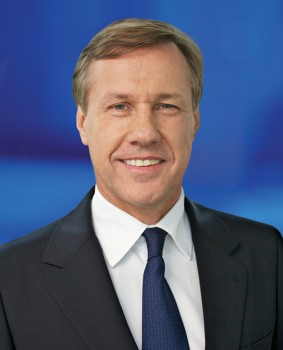Am 30. August 2013 führten Tom de Swaan, amtierender Verwaltungsratspräsident der Zurich Insurance, und Konzernchef Martin Senn eine Telefonkonferenz mit Analysten durch. Anlass war der Freitod des Finanzchefs Pierre Wauthier und der Rücktritt von Verwaltungsratspräsident Josef Ackermann. Wegen der Bedeutung des Vorgangs dokumentieren wir die Diskussion hier im englischen Wortlaut.

Zurich-Chef Martin Senn sprach über den Rücktritt von Josef Ackermann und den Suizid von Finanzchef Pierre Wauthier
© ZurichTranscript analyst call, Zurich Insurance Group, Friday 30 August 2013
Tom de Swaan: Good morning. First of all, on behalf of the Board of Directors, I would like to express my deep sadness at the passing of Pierre Wauthier and to offer my sincerest condolences to his family.
As announced yesterday, we have accepted the resignation of Joe Ackermann from his role as chairman of the board. I would like to emphasise that this was his decision, based on his own personal reasons, and I do not want to speculate on those. There is no doubt that these tragic events have cast a shadow over Zurich.
I would also like to address speculations by media about the letter left by Pierre Wauthier. We were informed that such a letter exists, and we are aware of its contents. And it’s correct that it relates to the relationship between Pierre Wauthier and Joe Ackermann. But it would be inappropriate for me to elaborate on it. It’s a very difficult situation, especially for the family and friends of Pierre Wauthier. And we all need to respect their privacy during this difficult time. We deeply regret his passing, which was completely unexpected.
Having said that, the board sees it as its prime responsibility to look into the question as to whether there was undue pressure placed on CFO. Let me be absolutely clear: we, meaning the Board and management of Zurich, take corporate culture and behaviour very seriously. In addition, from my own personal perspective, I am not aware of any behaviour that would be considered inappropriate in a Board setting. The current management team has the board’s full support. We of course fully recognise that the recent developments have been extremely unsettling and our focus is on ensuring the continued stability of the company. We are well aware of the need to strengthen the management team, and I consider this to be our top priority. I am confident that Zurich will remain in the front rank of the insurance industry with a strong brand, top tier business performance and a strong commitment to its customers, employees, shareholders and communities.
And with that I would like to hand over to Martin Senn. Thank you.
Martin Senn
Senn: Thank you very much, Tom, and good morning to you all. I am deeply saddened and shocked by the death of Pierre Wauthier and my thoughts and heartfelt condolences are with his family, his friends at this most difficult and extremely difficult time. Pierre was not just our CFO, but he was also a terrific colleague to me and to many other people in our company. He was highly regarded throughout the organisation and in the investment community, and he did an excellent job at all times. And I must tell you, we truly miss him.
I am pleased that Vibhu Sharma will now lead the group finance function on an interim basis, bringing with him a wealth of insurance knowledge and experience. He assumes this position from his recent role as group controller and former CFO of Zurich North America, uniquely qualifying him with an excellent grasp of the numbers and the knowledge of the Zurich group. I and all my colleagues from the GEC have every confidence in Vibhu’s leadership skills and we fully support him. With respect to what happened in the last few days, I want to make it crystal clear that there is no link between this news and Zurich’s business and financial performance.
Let me just emphasise two key points we made at the half-year results which remain entirely unchanged. First, while the results were somewhat mixed, we continue to be very profitable, and we continue to generate very healthy cashflows. Second: we have a strong and resilient balance sheet with solvency at the half year comfortably within our target range. And to conclude on this point, we stand by everything we said at the half year.
I fully endorse the need for the Board to look into the question as to whether undue pressure was placed on our CFO Pierre Wauthier and I would reiterate Tom’s comment that we take corporate culture and behaviour very seriously. Now that does not take away the fact that Zurich remains a great and solid company, and I want to emphasise our strategy remains unchanged by the recent events. Clearly my immediate priorities are working with the board to restore the strength of the group executive committee, and our updated strategic plan which we report on at our Investor Day in December. And with that I would like to hand over to James Quinn, our head of Investor Relations. Thank you very much.
Questions and answers
Quinn: Thank you, Martin. We will now take a few questions. As you may appreciate, we will not take questions relating to Pierre or his relationship with our former Chairman.
Operator: The first question comes from Michael Huttner from J.P. Morgan. Please go ahead, sir.
Huttner: Good morning, thank you very much. I just come and play devil’s advocate here, and take the comments from the Tagesanzeiger this morning, which suggested that your former Chairman thought that the results were painted rosier than they are. If I were in that situation, I might be tempted, I would think about it certainly, to do what some of the UK insurers have done, which is to rebase expectations. And some of them have done that quite successfully after rebasing, for example, the dividend by quite large amounts, and since then the stock has developed very positively. Could you give me your thoughts on that, please?
Senn: Good morning, Michael. Well, let me make a point that of course we don’t to speculate on any media reports, and quite frankly, I’ve not read that report yet in the Tagesanzeiger you are referring to. But what I want to stress is clearly that everything that was said at the half year stands, and with that as well the fact that we pay, continue to pay a sustainable and competitive dividend, as has been our policy in the past. We have stated our cash flows remain strong, that the balance sheet is strong, and that the financial results and the quality of our reporting from accounting and solvency point of view has not been sort of impacted by these recent events. And I hope that this answers adequately your question, Michael.
Huttner: I understand that you are saying you stand by what you said. But if there were any areas of flexibility whatsoever in the area of interpretation, whether one might actually think about the other course of action. Or is that something you don’t even think about?
Senn: But explain to me please Michael what you refer as flexibility. Again, bear in mind I have not read that article yet.
Huttner: I just saw it on Bloomberg, and all I can see on Bloomberg is that it says something about a rosy interpretation of results, or something.
Senn: Now look. The results as we have reported them at the half year and in any other reporting period, they are what they are. They are not in any way different than what proper, effective, prudent accounting requirements are. These results are independently reviewed by our auditors. Any comments made now in terms of bringing this incident back into the results, I consider totally unfounded. Thank you, Michael.
Operator: The next question comes from Andrew Ritchie from (inaudible).
Ritchie: Thanks for hosting this call today. Malcom, a question just thinking more in the medium term. There has been quite a lot of turnover of the management, senior management in the last three years. Maybe you could just give us some perspective – and I think Tom de Swaan, you mentioned that you felt the board felt the need to strengthen the management board, in any case, despite this week’s events. Just give us your perspective on where you think the management board needs to be strengthened, and some reassurances as to what’s going on in below the senior level in terms of management turnover. Because obviously from the outside it looks like there has been a considerable amount of turmoil in the last three years.
The second question: Is there any sense of timing and thinking about the Chairman replacement, and are you aiming to do it before the next AGM, and is the preference for an external candidate.
De Swaan: Let me answer the second one first. As you know there is legislation pending, if I may call it that way, in Switzerland based on the Minder Initiative which leads to the situation that in the next AGM the whole board has to be elected by the shareholders. And it is our clear intention before that time to have, to have a chairman who then can be elected in the AGM next year.
Ritchie: And the preference is external versus internal?
De Swaan: I would not like to speculate on that. It’s too early for that. Thank you.
Turnover of senior management
Senn: With regard to the first question, we recognise that there have been a number of high management, high profile management departures over the, say three years, four years. We also recognise that while we make progress in our business, our results have been somewhat mixed, I referred to that already. Now in relation to the turnover of the GEC, let me make the point that these changes are all unrelated, and not just this year but those in prior years. And by attempting to see patterns in all of these years, it’s very clear that no such patterns do exist. And that said, you know what we need to do. We have said that we will restore the strength of the GEC, I’ve mentioned that, Tom de Swaan has confirmed that in his statement, and we continue to work on our strategy. We will report back to you in December about this. It is important at this difficult time that we pull together, and I am convinced that we will come through with this as a stronger company. With regard to timing, Andrew, I will not make any specific comments on when the strengthening of the team is to be finalised. When I say strengthening of the team I refer to two specific positions of course. That is the appointment of the CFO and the appointment of our head of group operations. Both positions get into the Group Executive Committee. Clearly the commitment of the board, and my commitment and the management team is to make these replacements as soon as possible. Having said that, I do not compromise on the quality of the candidates versus the timing of the candidates. I know that the board, we are totally aligned on that point as well.
Ritchie: And below the GEC level, has there been a similar level of turnover, or not?
Senn: The turnover below the GEC level is absolutely in line with the turnover within the marketplace, totally comparable. It fluctuates. If you go back, say, three or five years it fluctuates a bit, sometimes a bit more sometimes a bit less. But on average, the same level.
Operator: The next question comes from Ralph Hebgen from KBW.
Hebgen: Good morning, thank you for taking my question. I just have a factual question relating to the legal requirements of making announcements of a financial nature to the market. As an example, when you became aware that there was the requirement to top up reserves in the German operation. What is the time scale from the point in time when you become aware of a, let’s say, financial development or financial dynamic, to the point where you need to announce this to the market? It would just be interesting to understand the legal requirements, or the regulatory requirements of making such announcements. Thank you.
Senn: Thank you. I, to be quite frank, do not want to respond, and rather refer that to offline discussion, because this is not really a topic which I think we should discuss today. And James will get back to you to guide you through that.
Operator: The next question comes from Patrick Noel from Groupama.
Noel: Hello, good morning. I have a question about your last four quarters results, because quarter after quarter we saw one-offs, negative one-offs. Perhaps you are unlucky, but when I see your peers, they don’t have so much problems. So, those bad news quarter after quarter let me think that there are perhaps some fundamental problems in your company. So perhaps, I don’t know if you can answer now, but perhaps later. Thank you very much.
Senn: Thank you Patrick, and I take your suggestion that we will follow up on this response later. I also want to stress here that it has nothing to do with the intention of today’s call, and investor relations will come back to you on that. Thank you very much.
Operator: The next question comes from Thomas Seidl from Bernstein.
Seidl: Thank you, and good morning, everyone. Now because it is dealing with the CFO here, we have been made aware of concerns that this has to do with reporting. How would you respond to those concerns?
Senn: Thank you, Thomas. I was hoping to be firm in my opening comments that the recent developments have nothing to do with reporting format, with the quality of our reporting, with the accuracy of our reporting. I think there’s no link in any respect to that.
Seidl: OK, thank you.
De Swaan: Can I add something here. One of my first conversations after I was appointed acting chairman was with the chairman with the audit committee of the board on this. And he assured me that there was nothing – and as you can imagine they had a lengthy discussion on the half-year results – there was nothing he had to report to me in any connection with this.
Seidl: I think the reason for my question also is at the Q2 q/a session I sensed there were more questions on reporting than in previous calls. And with hindsight it just struck me in the context of recent events.
Senn: Thank you Thomas. Let me just as well make that point, there is no correlation and no sort of factual link to that. Totally unrelated, and one should not have any doubt in the reporting structure and the accuracy of these numbers. In relation to what has happened now.
Seidl: OK, thank you, have a good day.
Operator: Ladies and gentlemen, the conference is now over.
Transkript: Valerie Tadesse
Dieser Beitrag ist nur für Premium-Abonnenten vom Versicherungsmonitor persönlich bestimmt. Das Weiterleiten der Inhalte – auch an Kollegen – ist nicht gestattet. Bitte bedenken Sie: Mit einer von uns nicht autorisierten Weitergabe brechen Sie nicht nur das Gesetz, sondern sehr wahrscheinlich auch Compliance-Vorschriften Ihres Unternehmens.



Diskutieren Sie mit
Kommentare sind unseren Abonnenten vorbehalten. Bitte melden Sie sich an oder erwerben Sie hier ein Abo